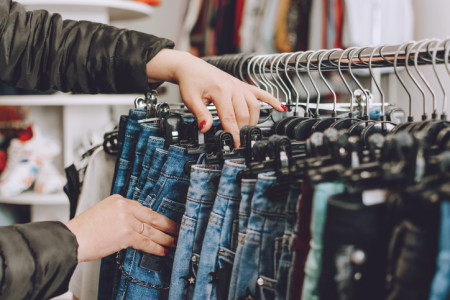
University of Bolton, Deane Road, Bolton. BL3 5AB
Tel:
Email:


“At the University of Bolton, we take great pride in providing a quality, supportive learning environment for our students.”
Professor George E Holmes DL | President & Vice Chancellor
“...tutors are very supportive and you’re not just a student ID number, at this university you are an individual with a name.”
Ellisse Vernon | BSc (Hons) Adult Nursing
Back to menu
Back to menu
Study with an Off-Campus Partner
Back to menu
Back to menu
University of Bolton, why we are the right choice
Location - Bolton, Greater Manchester

16/02/2023
In a world where new clothing trends are being promoted on Instagram and TikTok every day, the fashion industry is one of the most prominent sectors to keep up-to-date with. With the help of major fast fashion brands like H&M and Primark, as well as online brands such as Boohoo, Pretty Little Thing, and Missguided, the industry has even built up quite a negative environmental reputation; contributing to over 92 million tonnes of waste, according to a research paper that was published in the Nature Reviews Earth and Environment.
Now, we know that huge steps have already been taken to improve sustainable fashion, but is there a way of reducing the environmental impact of fast fashion? Let’s take a look…
The ’30 wears’ challenge
Watching influencers modelling the latest trends in ‘shopping haul’ videos has caused a domino effect with regular shoppers demanding the next new thing to stay ‘on-trend’. After all, when an item was cheap in the first place, it doesn’t take much thought when disposing of it to buy something else.

This is where the ’30 wears challenge’ that Livia Firth, the co-founder of Eco Age created, becomes useful. As buyers, we need to stop and think about whether we really need the item. “Will I wear it 30 times?” “What do I already own at home, and will it go with any of my existing outfits?” If the answer is no, then chances are it will be an impulse purchase that you don’t need and will unnecessarily fuel the fast fashion industry in an unsustainable way.
Look at what materials clothing is made out of
One of the main questions you need to ask yourself about fast fashion is the material of a particular garment. Perhaps, you’re looking for a new outfit for work that you are going to wear multiple times. In which case, you need to take a look at the item’s material and see if it is likely to last a long time. Fast fashion products often have a short life cycle, so in this case, it wouldn’t be the most sustainable option. Alternatively, you might be environmentally conscious. Over 60% of clothes are made from petroleum-based plastic fibres; fibres that aren’t recyclable and immediately end up in landfill. These materials are also known to release plastic microfibres that could end up in the ocean through your own washing machine. For example, a study found that 700,000 microplastic fibres can be released into the environment from a single washing machine.
This doesn’t mean you shouldn’t buy fast fashion items. It just means you should be a more thoughtful consumer. Keep these thoughts in your mind when you’re on a shopping trip, and you will be consciously making a difference in the future of sustainable fashion.
Are you going to want an item after 24 hours?
A key thing with fast fashion trends is that because they change so quickly, the current one gets forgotten about when the new one comes along. This means if you aren’t the first to jump on a trend, the less time you have to enjoy a product before it becomes outdated. Instead, a better mindset to adopt is to re-visit a garment after 24 hours of viewing it and see if you still want it. If it is going to be a worthwhile purchase, then you’ll still desire it the second time around.

Stay tuned in to the latest fashion trends at the University of Bolton!
Interested in pursuing this trendy career path? Did you know you can develop your fashion skills with a BA (Hons) Fashion degree at Bolton University?
Our fashion students are valued members of the Bolton School of the Arts, studying in excellent facilities with the direct support of creative and passionate lecturers who teach a course that responds to contemporary practice in the fashion industry. One of our modules specifically prepares students for their industry placement; including industry-based visits to working studios, personal and professional development planning, and networking and entrepreneurial skills content.
Let’s explore some more course highlights of our fashion degree:
- Students receive regular guest lectures from specialists in different fashion fields to ensure that they have opportunities to learn from industry experts
- Lecturers offer face-to-face sessions, ensuring that students have access to help and support whenever they may need it
- Fashion degree students are encouraged to showcase their skills by entering national and international design competitions
- Students are exposed to fashion and fabric companies from the contemporary design world through our links to design groups, manufacturers, and supporting agencies. Giving them the chance to attend exhibitions and dedicated trade shows for fabric and sustainability fashion issues in the UK and abroad
Want to study in a positive and supportive learning environment? Are you appealed by the thought of small class sizes that mean the lecturers know you by your name rather than your student number? The University of Bolton could be a great investment in your future… and we would love to support you on your journey.
Come and visit by registering for one of our upcoming Open Days. Speak to our lecturers, take a tour of our friendly and inclusive campus, and find out why our students love life at Bolton.
To look at the full details of our fashion degree, click here. For further information, please contact us at enquiries@bolton.ac.uk or call on 01204 903807; we are here to help!